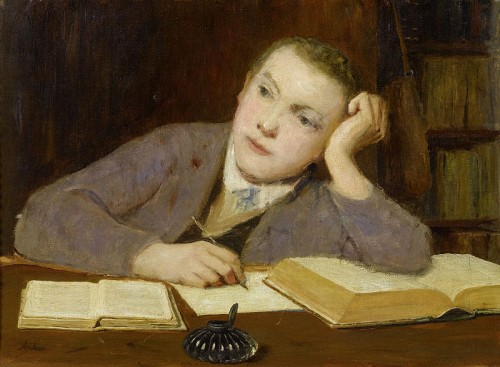
I always knew one of my children was a little different. At age two, he could quickly complete complicated puzzles that his six-year-old brother struggled to put together. His mind just saw the way it had to be! He was incredibly smart and continually amazed us with his mechanical mind and ingenuity.
When I began teaching him to read, though, he struggled. He changed b’s into d’s and 9’s into 6’s. More telling, though, was the fact that he couldn’t remember little words. If he was reading “Tim and Tom and Mary and Jan” he would have to sound out the word “and” every single time. He could not remember it from one second to the next. I had him informally tested, and he “passed.” We were told he was not dyslexic. That put my mind at ease for a short while, but not for long. Signs which could not be explained any other way continued to crop up.
He skipped words or even lines while reading, as if they weren’t there. He read words backwards. He added letters that weren’t there or deleted ones that were. He ignored punctuation marks. Reading and spelling became a horrible chore. We had him tested again by a trained psychiatrist and found out that he was, indeed, dyslexic.
At first I was stunned. I had feared this was true. I had known it somehow, deep down. Yet the truth still felt like a punch in the gut. How would this affect him? What would this mean for his long-term future? Could we handle this?
Although it did not feel like it at the time, receiving that diagnosis was a blessing. We could finally begin to understand what we were dealing with and address it in ways that are making a difference. My patience increased exponentially overnight, as I realized that he really was doing his very best, and as I began to see school through my son’s eyes.
I am grateful that I found some excellent programs for him, even before I knew for sure that he was dyslexic. The psychiatrist was shocked that our son was less than a full grade level behind in his reading and spelling, and he attributed that to the strength of the programs we were using.
Dyslexia is not diagnosed only by a child being behind. It has to do with the discrepancy between the level he is working at when reading and writing versus the level he is able to work at when those components are removed and he is listening and speaking. There were eight grade levels of discrepancy between those two points for our son, so although he wasn’t very far behind his grade level, he was miles away from living up to his potential academically.
It has been almost four years since he was diagnosed. We’ve kept the good and improved on the rest, and each school year has been better and better. Our son is thriving and is actually up to grade level now in his reading. His spelling is coming right along, and he is achieving spelling success every week rather than constant failure. Our family built the website My Audio School to address his core content needs through the auditory pathway. My Audio School provides the auditory learner with access to hundreds of recorded classic books, educational old time radio theater and historic news broadcasts. We are using Writing with Ease and Institutes for Excellence in Writing to help our son learn to communicate on paper.
If any of this rings a bell, I encourage you to check out this article from All About Spelling about Symptoms of Dyslexia and this one I wrote about Helping Dyslexics Help Themselves. I didn’t want to face the truth, but it has truly set us free. Now we are working with our son’s strengths and helping him learn how to accommodate for his weaknesses.

About Molly Evert
Writer Molly Evert is a wife and homeschooling mom to 6 kids, who range in age from 2 to 18. She runs an educational website, My Audio School (http://www.myaudioschool.com), providing access to the best in children's audio literature. She also blogs at CounterCultural Mom (http://www.counterculturalmom.com) and CounterCultural School (http://www.counterculturalschool.com).
- Web |
- More Posts(146)


